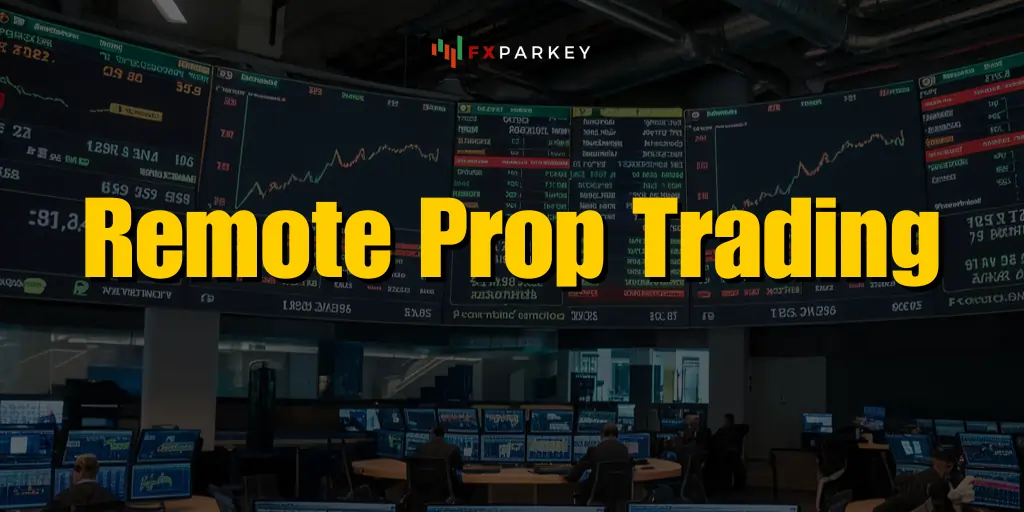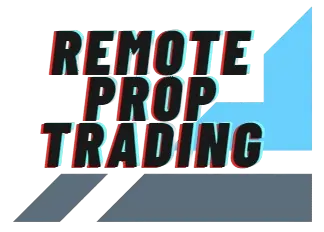
Remote proprietary trading, often referred to as remote prop trading, is a dynamic and increasingly popular approach within the financial trading industry. It allows traders to operate from anywhere globally, leveraging the capital and resources of proprietary trading firms (prop firms) without the need for a physical office presence.
This model has gained traction due to technological advancements and changing work environments, particularly accelerated by the COVID-19 pandemic. This article deals with the intricacies of remote prop trading, its benefits, challenges, and the technological and regulatory landscapes shaping its future.
🔮 What is Remote Prop Trading?
Remote prop trading is a form of proprietary trading where traders use a firm's capital to execute trades from remote locations, typically their homes or personal offices. This model differs from traditional prop trading, which often requires traders to be physically present at a firm's office or trading floor.

In remote prop trading, firms provide traders with access to their capital, trading platforms, and other resources. Traders then use these tools to execute trades in various financial markets, including stocks, forex, commodities, and cryptocurrencies. The profits generated from successful trades are typically split between the trader and the firm according to a predetermined agreement.
💁♂️ How Remote Prop Trading Works?
The process of becoming a remote prop trader typically involves several steps:
✔ Benefits of Remote Prop Trading
Remote prop trading offers several advantages for both traders and firms:
👉 For Traders
👉 For Firms
Challenges in Remote Prop Trading

Remote proprietary trading presents several advantages, but it also introduces distinct challenges that traders must navigate. One of the primary challenges is self-discipline, as working remotely demands strong time management skills and the ability to maintain focus without direct supervision.
Additionally, technical issues can pose significant problems; reliable internet connectivity and robust hardware are essential, as any technical failures could result in missed trading opportunities or financial losses.
Another challenge is isolation; the absence of in-person interaction with fellow traders can be difficult for those who perform better in collaborative settings. Furthermore, regulatory compliance adds another layer of complexity, as firms must ensure that their remote traders adhere to relevant financial regulations, which can be particularly challenging when operating across multiple jurisdictions.
Technology in Remote Prop Trading
Technology plays a crucial role in enabling and enhancing remote prop trading:
🔗 Choosing a Remote Prop Trading Firm
When evaluating remote prop trading firms, traders should carefully consider several key factors. The capital allocation offered by the firm is crucial, as it determines the potential scale of trading profits. Equally important is the profit split percentage, which dictates how much of the earnings will be shared with the trader.
Traders must also assess any trading restrictions imposed by the firm, such as limitations on strategies, instruments, or risk parameters, to ensure alignment with their trading approach. The quality of the firm's technology and the level of technical and educational support are additional considerations that can significantly impact trading efficiency and growth.
Finally, thoroughly researching the firm's reputation, regulatory compliance, and feedback from current or former traders provides valuable insights into the firm's reliability and trader satisfaction.
🔮 The Future of Remote Prop Trading
As technology continues to advance and the global workforce becomes increasingly remote, the future of remote prop trading looks promising.
Several trends are likely to shape its evolution:
All Common Queries
What is Remote Prop Trading?
Remote prop trading allows traders to work from home or any location, using a proprietary trading firm's capital to execute trades in financial markets.
How does Remote Prop Trading differ from Traditional Prop Trading?
Remote prop trading eliminates the need for traders to be physically present in an office, offering flexibility and reduced overhead costs compared to traditional prop trading.
What are the benefits of Remote Prop Trading?
Benefits include flexibility in work location, access to professional trading tools, the potential for high earnings, and the opportunity to trade with a firm's capital rather than personal funds.
What markets can Remote Prop Traders typically access?
Remote prop traders often have access to various markets, including stocks, futures, options, and forex, depending on the firm's focus and the trader's expertise.
How do Remote Prop Trading firms make money?
These firms typically earn through profit-sharing agreements with traders, where they take a percentage of the profits generated from successful trades.
What qualifications are needed to become a Remote Prop Trader?
Requirements vary by firm but often include passing a trading evaluation, demonstrating consistent profitability, and sometimes having prior trading experience or relevant education.
Are there risks involved in Remote Prop Trading?
Yes, risks include potential financial losses, stress from market volatility, and the possibility of losing access to the firm's capital if performance targets are not met.
🔮 The Bottom Line

Remote prop trading represents a significant shift in the financial industry, offering new opportunities for traders and firms alike. By leveraging technology and embracing flexible work arrangements, remote prop trading is democratizing access to financial markets and creating a more diverse and dynamic trading ecosystem.
However, success in remote prop trading requires a combination of trading skills, self-discipline, and technological proficiency. As with any form of trading, it's important for individuals to thoroughly research and understand the risks and responsibilities involved before engaging in remote prop trading.






